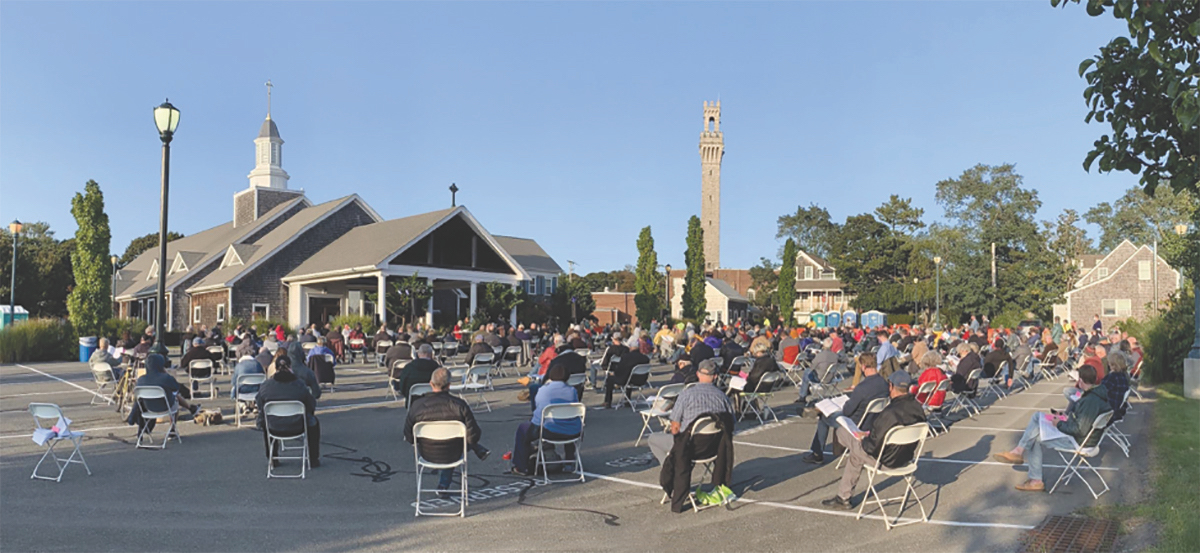
PROVINCETOWN — The long-delayed annual town meeting moved at a brisk pace on Monday, Sept. 21, with the chilly weather perhaps encouraging voters gathered in the parking lot at St. Peter the Apostle Church to reach a consensus.
The meeting was completed in just under two hours — an achievement for any Cape town, and especially one as prone to contentious debate as Provincetown, where meetings have commonly stretched to two and even three consecutive evenings. The meeting was also remarkable for the level of agreement, with no more than a scattering of “no” votes for any of the articles.
Article 8, concerning the Gosnold Street dune project, was approved with little discussion, and Article 9, a series of Community Preservation Act grants, including a land acquisition for senior housing at Maushope, was approved quickly as well. The grant of $425,000 will allow the Provincetown Housing Authority to expand its affordable senior housing efforts, according to PHA Director Kristin Hatch, who is seeking to add 10 to 15 units of supportive senior housing on the site.
Article 11, a $595,000 bond payment for the debt used to acquire Harbor Hill, provoked the longest discussion, beginning with presentations from Nathan Butera of the Year-Round Market-Rate Rental Housing Trust and select board member Louise Venden. Butera’s report included information on the current tenancy of the project — 50 people, including eight children, with the 28th and final unit scheduled to be occupied on Oct. 1 — and on the trust’s efforts to pursue a broad range of financing, ownership, and management arrangements.
The project is currently in the third year of a three-year management contract with the Community Development Partnership in Eastham. A capital needs assessment identified $800,000 worth of maintenance that ought to be done in the next five years, and the trust is studying whether outside capital can be involved in the project.
Eight people rose to speak on Article 11, raising questions about the cost structure, and arguing for and against town involvement in middle-class housing.
A tenant in the building, Jaime de Sousa, was last to speak. “As a resident of Harbor Hill, I encourage folks to support this article and also future articles that have to do with affordable and market-rate housing,” he said. “Studies have shown that as housing availability declines, my entire age bracket is projected to decline. To secure the longevity of Provincetown as we know it, it’s important to have housing for all.”
A series of church bells rang out in heavy tones while de Sousa spoke. The somber tones seemed to have a settling effect — the vote was called immediately after, and the article passed with fewer than 10 votes against it.
Article 13 appropriated $12,600 to hire an indigenous peoples consultant, who will help develop at least one public art project and study other forms of representation. Article 14 banned plastic water bottles under one gallon, and Article 15 set the town’s zero-emissions goal into town bylaws. Fewer than 10 people voted against Article 14, and no one voted against 13 or 15.
Another interesting development at this town meeting was the debut of a group called Four Hundred Plus. On at least three articles, speakers began their public statements with “I stand in solidarity with Four Hundred Plus, an intersectional and intergenerational, queer and allied collective of seasonal, transient, and permanent residents.” Carolyn Clough advocated for Harbor Hill with this identifier, and other speakers rose for the indigenous memorial project and for the zero-emissions bylaw.
“We started meeting in June, and we’re meeting every Tuesday night at the Provincetown Brewing Co.,” Clough told the Independent. “We’re a collective that’s sick of racism, misogyny, homophobia, transphobia. Instead of celebrating the Pilgrims taking this land, we want to see a new era. We did the Black Lives Matter chalking all over town on Labor Day, and we met on the Sunday before town meeting to go over the articles and see where we wanted to speak.”
Organized public comments may not be entirely new for Provincetown, but they’re not typical. Town meetings are always a disparate collection of subjects, initiatives, and budgetary housekeeping — and for one to be this short and generally sweet was quite the September surprise.
